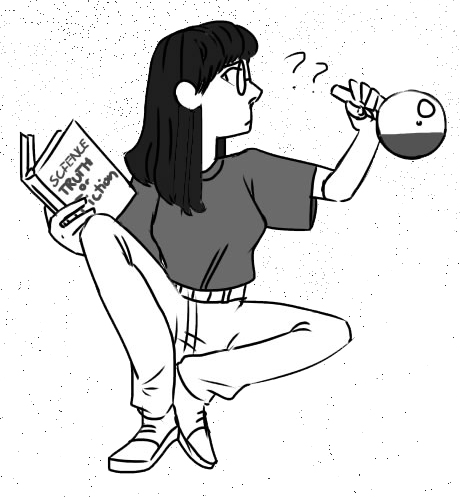

“Science doesn’t exist in a vacuum,” says AP Biology teacher Katherine Ward, “Everyone tends to think that science is separate from society and it’s not. Natural phenomenon exists without us noticing it … so the process of noticing it and experimenting is a human thing. So since it is a human thing, is it open to human influence? Sure.”
In Aragon classrooms, science and history teachers alike talk about the connections between society and science in their classroom discussions.
“In Government class, we talked about the presidential election when they were talking about climate change,” says History teacher Michael Gibbons, “We [also] talked about [science] in U.S. History class when looking at the history of evolution and the Scopes Monkey Trial in the 1920s.”
Although climate change and evolution are examples of scientific topics that remain politically controversial, they are still able to be taught in Aragon.
To her AP Biology class, Ward teaches evolution as a theory backed up by substantial evidence. “For things like evolution, there is no prohibition,” says Ward, “There is absolutely evidence to argue that [evolution] happens … [It’s]a process that exists in science that explains natural phenomenon, and that is what science does. Science looks for patterns and processes that explain phenomenon, and so there is no prohibition or law against me describing patterns and processes that explain natural phenomenon because that’s in the province of science, that’s my job.”
Sometimes however, students who deny evolution would express their concerns to Ward.
“And my response is: ‘I’m not testing you on what you believe,’” Ward says, “‘I’m testing you on what you understand. There is a process, this process functions this way, here is example after example after example that this process is occurring; do you understand how this process occurs — not do you believe that this process occurs.’”
Sophomore Armaan Namini agrees with this. “A science class isn’t really a place to discuss like what people think of [science],” says Namini, “Because that’s not the point … [teachers] are just supposed to teach the science itself. They’re just giving you the facts, that’s it. Whatever you take out of it is your problem.”
Regarding the reasons for this disbelief, some do not agree with evolution due to influence from their religion.“Religion often establishes creationism as fact and evolution kinda combats creationism,” says Sophomore Nina Paoli, “so in order to hold onto their religious beliefs, people will deny evolution.”
Others may not agree due to the nature of science itself. “Science is a theory, science actually tells us that this is our best guess as to why these happen — is it 100 percent? Usually not,” says Gibbons. Sophomore Dorothy Tsai is a Christian and she does not fully believe in evolution, but she says that her religion only plays a small part in her disbelief.
“I don’t believe in evolution the way scientists describe it,” says Tsai, “like just becauses we have something in common doesn’t necessarily mean we have a common ancestor … I don’t believe that evolution is drastic enough to give like whales legs and make humans or the other way around … [Christianity] offers an explanation that makes more sense to me.”
She also adds, “Because science is always advancing and changing, [evolution also] might not be [even the] full truth.”
However, despite personal beliefs, Tsai still believes that evolution should be taught in classrooms.
“[A]fter all, it’s still a theory,” says Tsai.
As for climate change, AP Environmental Science teacher Megan Thaler states that it is being taught in the curriculum not only because it is on the AP exam, but also because there is really no scientific controversy at all. “If 99 percent of scientists agree on something, why would you call that a controversy?” says Thaler, “[T]here’s just this made up controversy that’s all political, by people who want to deny facts and evidence.”
Paoli agrees, “A lot of people will deny scientific facts because they don’t want to believe them, so for example, for global warming … people don’t want to believe that they’re causing this type of damage to the environment.”
Gibbons believes that economic factors also come into play. “There’s a lot of vested interest in the use of fossil fuels,” says Gibbons, “so there’s a lot of money riding on that.”
Economics teacher Kevin Nelson agrees and adds, “If climate change is real, then we have to stop and limit what businesses do, and conservatives don’t like that.”
In Thaler’s AP Environmental Science class, Thaler also addresses the political and economical sides of this issue.
“I really try to get people to see both sides of it, I mean, when you’re talking about changing industries and using fewer fossil fuels and talking about climate change and all this stuff, politics is really an important part of it,” says Thaler.
She concludes, “You want [students] to be able to come up with evidence -based explanations to things when people give misguided statements. Lack of understanding of science is a huge problem, and then people just repeat what they’ve heard other people say.”
